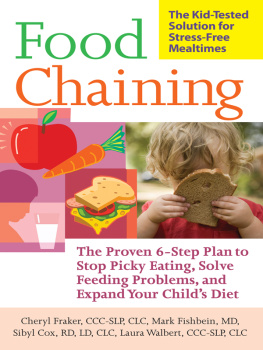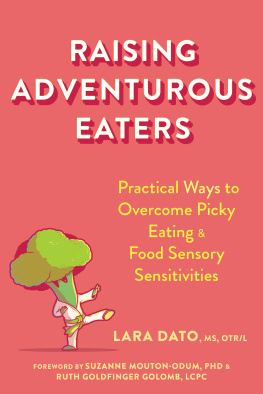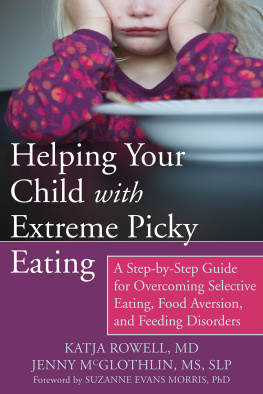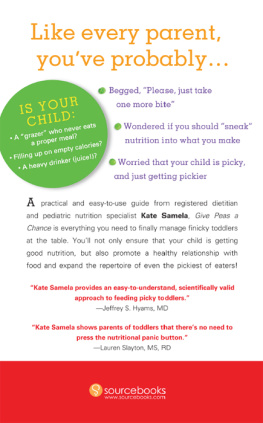Acknowledgments
Writing a book is a big undertaking and one I could not have accomplished without the help and support of others. I thank my husband, Don, for his steadfast encouragement; my agent, Judith Riven, for her faith, responsiveness, and advice; the families and staff from the Professional Center and Cambridge Head Start for their stories and insights.
For helping me write more clearly, I thank my editors, Kathryn McHugh and Lindsey Moore, and the three special women in my writers group: Joan Cass, Deb Hagan, and Sarah Auerbach.
For their encouragement and feedback, I thank Dr. Alan Crocker, Beth Horning, Dr. Ronald E. Klienman, Dr. Deb Turiano, Dr. Allan Rosenberg, June Piette, and Joanna Bond.
For favors big and small I thank Maria Bartlett, Cynthia Bayerl, Nancy Clark, Sherry Cohen, Molly Holland, Fran Peterson, Rena Prendergast, Gino Zaccardelli, and Helena Szudy.
And last, I thank my parents, Anna and Rinaldo DiCocco, for giving me love, good food, and the inspiration to dream.
Introduction
Is your childs picky eating a passing stage or something more? For years, pediatricians and well-meaning relatives have told parents not to fret over a young childs food refusals, identifying picky eating as just a stage that most children outgrow. But many parents, struggling to provide their kids with a reasonable, nutritious diet, find this advice too dismissive.
They may be onto something. Proof abounds that millions of kids are not outgrowing their early pickiness. According to the Healthy Eating Index (HEI), developed by the Center for Nutrition Policy and Promotion of the U.S. Department of Agriculture, 70 percent of American children have diets defined as needing improvement. The scores actually get worse as children grow older.
Its true that toddlers are notorious for refusing food. Age and developmental stages play a key role in when and why children say no to food. But new issues are also emerging. Parents with their own food or diet concerns, busier lifestyles, and advances in medical technology add new complexities. For a small but growing number of children, food refusals are longer-lasting and more deep-rooted. Many children are at risk for feeding disorders. Babies born early, and those with autism or other special needs, often struggle with eating. A surprisingly high number of children under age five fall into one of these categories.
Furthermore, the number of such children is growing:
According to government figures, the number of children with a low birth weight has increased slowly but steadily since 1984.
The number of special needs children in public schools has risen over the last twenty years. Since 1986, with the passage of legislation mandating early intervention services nationally, the number of children receiving services has grown steadily.
While more and more children have these medical and biological conditions, they are also more likely to have parents or siblings with their own food issues.
Family members with their own food struggles are less equipped to help and may actually compound a young childs eating problems. Researchers from Stanford University found differences in how mothers with past or present eating disorders presented food to their children. As Americans face an epidemic rise in obesity and other eating disorders, parents and other family members are likely to be even more concerned when a young child refuses food. Many want ideas on how to cope better with these challenges.
Eating problems can be complex, emotionally charged, and difficult to solve. To make matters worse, children grow and change from one day to the next, so its sometimes hard to determine where one problem ends and another begins. In order to cope with your picky eater, its necessary to recognize the multiple influences of your childs developmental stage, social dynamics, nutrition, sensory issues, and feeding skills. Collaborative work with other health professionals has helped me to see picky eaters in a broader context. I have watched speech therapists help children with chewing and swallowing, physical and occupational therapists help children with sensory issues or motor skills, and social workers and psychologists provide helpful insights into social dynamics.
The reasons why kids refuse food can be nonsensical and, at times, maddening. It is easy to lose perspective. Just Two More Bites! (that familiar refrain) explores ways to make eating more enjoyable for children. But there are limits to what you can do, and it is important to recognize those limits. This book will show you the situations in which you can influence your childs eating for the better. It also explores situations in which picky eating is more than a passing phase and lists resources to help you find specialized help, if need be.
You wont find magical recipes guaranteed to make your child eat. But you will find
Guidelines on how to recognize whether picky eating is a health problem for your child
Real-life answers about how to handle day-to-day food struggles
Tips for finding and filling nutrition gaps
Strategies for children with heightened sensitivities to food textures or flavors
Information about feeding specialists and other resources
Over the last twenty-five years, I have worked as a pediatric nutritionist and registered dietitian in early intervention, preschool programs, and private and public schools. During that time, I have observed more than one thousand picky eaters and listened to their parents. I have watched my young clients and learned from their struggles. In a sense, their stories have become my stories, and I use them to illustrate what I have learned about picky eaters in the pages of this book.
I hope that the stories of other children combined with practical tips and research findings by social scientists give you insight and inspiration to improve mealtimes for you and your family.

Solving the Puzzle of Picky Eating
R alph and Katy Greene are committed to having family meals. They juggle work, long commutes, music lessons, and nap times so that they can share at least one meal a day with their three kids. Yet family mealtimes are not working out as planned.
Instead of warm, bonding experiences, they are nonstop battles. No matter what the food, the kids whine and complain. On any given night, one of them will refuse to eat.
Take pasta night. Eighteen-month-old Ned is the hardest to please. He eyes every food suspiciously. When he spots something he doesnt want, hell scream, No, no, no. Now and then, he simply says Yuck and drops food on the floor.














